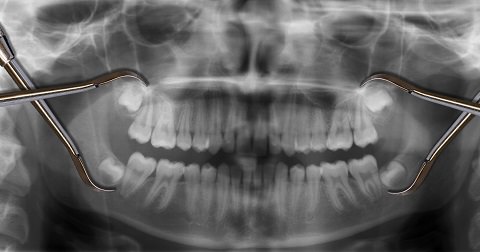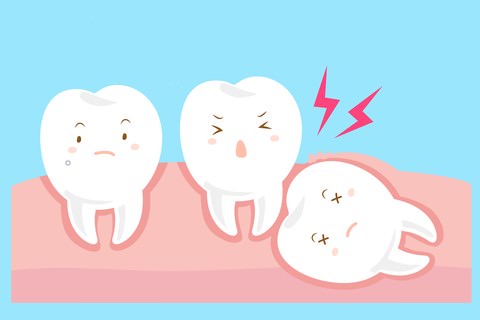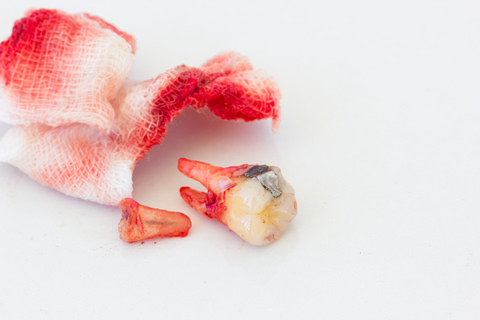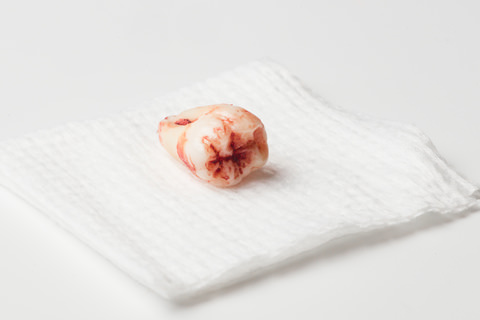Wisdom Teeth Recovery: Preparing For What Comes Next
Are you fearful of getting your wisdom teeth removed? Or maybe you have them removed and don’t know what to do next?
Today I’ll answer these questions and more regarding wisdom teeth recovery.
Better still I’ll show you how to take care of your mouth afterwards so recovery is a breeze.
Let’s begin so your road to recovery can be as smooth as possible.
Jump to Contents
Introduction into Wisdom Teeth
Wisdom teeth, scientifically known as back molars, are the last adult set of teeth that grow at the back of your mouth.
They grow at the top and bottom of the back of your mouth between the ages of 17-25.
Due to slow growth, often other sets of teeth occupy their place.
Such uneven teeth termed ‘impacted wisdom teeth,’ can cause you pain or infection, which is why dentists often recommend wisdom teeth removal surgery.
What Is The Recovery Time After a Wisdom Tooth Surgery?
Typically, completely recovering from a wisdom tooth removal surgery can take you around one week.
However, exceptions do exist.
Some people may require more time depending upon how long their body takes time to heal.
The surgery may cause minor bruising, swelling and pain across the jaw. These take time to heal and can consume up to 2-3 weeks.
Should I Take Time off from Work?
Wisdom teeth removal can cause swelling and minor bruises.
Dentists often suggest a few restrictions to help the healing process after the removal.
Even though the procedure takes two hours at most, healing differs from person to person.
Dentists recommend doing ‘little to no work’ for three to four days.
To access your gums, a dentist has to cut your mouth.
That cut separates the tissue from the bone – which is where the stitches come in. By minimizing the distance between wounds, the healing time is reduced.
There are two types of stitches used in the process: ones that are dissolved and disposed of by the body, known as ‘resorbable’ stitches, and ones that have to be taken out by the dentist.
Dissolvable Stitches
The biggest advantage of getting dissolvable stitches is that you don’t need the second trip to the dentist.
Once sewn, your body breaks them down itself and disposes of the by-products automatically.
In the past, animal intestines were used to make such stitches, usually from sheep.
However, now we have moved away from natural materials, and synthetic compounds are used to make dissolvable stitches.
The disintegration time of the stitches depends on the type of stitches used.
Gut sutures remain there for 5-7 days while chromic-treated guts last for 9-14 days.
If you opt for synthetic materials, like polyglycolic acid, expect the stitches to remain there for a month.
The stitches may come across as loosened or untied, but that is common when they deteriorate.
Non-Dissolvable Stitches
Non-resorbable stitches are made of materials that the body cannot dispose of on its own.
These materials include silk, polyester, and nylon as well as several others.
You must book an appointment with your dentist to take out such stitches.
Ideally, you would be expected to keep the stitches on for ten days before the dentist can untie them and take them off.
Are You Experiencing Bleeding?
If you are experiencing blood loss from the wound, don’t worry. It is completely normal!
Bleeding gums are a regular occurrence after tooth extraction as it includes making cuts to the gum.
Most of the bleeding occurs within 24 hours of the extraction, after which it dries up. However, during the first 24 hours, it can look pretty gruesome.
That is because the blood mixes with saliva, which makes it look like a lot of blood.
Worrying too much about it will only worsen the situation, so you need to stay calm.
Dentists do apply wet gauzes to soak initial blood flow from such wounds, but there are home remedies available that help cease the bleeding.
I’ll share some remedies I found useful with you:
1. Apply a wet gauze
A piece of wet gauze when rolled or folded over forms a good gum compressor.
Place the piece of folded, wet gauze over the wound and press gently to apply pressure.
This procedure has to continue for 45-60 minutes.
2. Bite on a black tea bag
Black tea leaves contain a tannic acid which is a coagulant, as in it aids the blood to thicken or harden. It helps create blood clots that stop bleeding.
This remedy should be carried out for at least half an hour.
3. Choose your diet carefully
Blood clots play a great role in wisdom teeth recovery. They are responsible for stopping bleeding and aiding the healing process.
Some beverages and food items negatively impact the healing process and can dissolve the blood clot – exposing the wounds.
These remedies are helpful for most patients. However, some patients are exceptional cases where they bleed more. In such a situation, you should immediately seek professional help.
First 24 Hours After Surgery
The bad news is that this will be the time when you’ll feel the most pain.
The good news is once these 24 hours have passed, the pain is likely to lessen gradually.
Gum bleeding will be at its highest during these hours. The swelling and numbness will remain.
2- 3 Days
After the first 24 hours have passed, blood clots start to form to prevent further bleeding.
Furthermore, the swelling around the cheeks and mouth decreases in these 2-3 days.
3-7 Days
In the first week from your teeth removal surgery, your swelling should be gone.
It is most likely that the dentist will call for you to remove your stitches in the seven days following your surgery.
After One Week
After one week has passed since your wisdom teeth removal surgery, normalcy returns to your life.
Your jaw will begin to feel looser as the stiffness and soreness of the surgery wears off slowly.
The surgery marks, if any, will also heal in 10-14 days.
Will I Experience Bad Breath?
When you have wisdom teeth removed, your ability to keep up with good oral hygiene is limited so the chance of getting bad breath after wisdom teeth removal is likely to increase.
This is basically because you’re unable to brush with the same intensity and consistency that you’re used to. Also, you have to give the back of your mouth a break and let it heal.
Furthermore, you’ll likely be taking medications for pain; a dry mouth is one of the most common side effects of pain medication.
While this will make you more comfortable, oxygen-rich saliva is the mouth’s natural defence against bad breath bacteria.
So even your natural defences might fail you when you need them.
Diet: Do’s and Don’ts of a Post-Wisdom Teeth Surgery
Great care needs to be exercised for the food you consume after your teeth removal surgery as your mouth is a sensitive place post-surgery.
While you wouldn’t want to eat much after the wisdom teeth removal (due to numbness and stiffness of the jaw) your nutritional health and hydration are key.
We’ll list down some great recipes for you to enjoy.
But first…
Avoid Straws
Any item that makes use of suction, like straws it’s a good idea to avoid them.
Avoid Alcohol
For at least one-week hours post the surgery, doctors recommend against taking alcohol.
If you have been prescribed medication of any sort, then experts recommend avoiding alcohol till you are on medicines.
The primary reason is preventing the blood clot from dislodging. The secondary reason is that medicines mixed with alcohol can be dangerous.
According to the National Institute on Alcohol Abuse and Alcoholism commonly prescribed pain medicine can prove to be fatal when mixed with alcohol.
Avoid Soft Drink
Sugar leads to tooth decay. Sodium leads to tissues being dry. Guess what contains both in heavy quantities? Yes, you’re right. Soft drink.
Drinking soft drinks will also lead to dislodgement of the blood clot among other things.
Avoid soda cravings for at least a week. For your own good.
Wisdom Teeth Recovery: What to Eat
You will find tons of recipes online on how to make the best post-surgery meal.
I picked out 2 recipes from Trust Dental Care’s article Wisdom Tooth Extraction: 10 Foods to Eat After.
I think these are best suited to the numb and stiff mouths we suffer from after our surgery.
Let’s get straight to some of the recipes you can eat post-wisdom teeth removal surgery:
Soups
Soups not only provide you relief in their lukewarm state but also fulfil the nutritional requirements of your body. Here’s how to make them:
Step 1: Prepare the vegetables. Chop two leeks, chop one to two pounds of broccoli (a bunch) and cut one small peeled russet potato into tiny pieces.
Step 2: Cook the leeks in four tablespoons of unsalted butter with a 3/4 tablespoon of kosher salt and a 1/4 tablespoon of black pepper in a large pot over a medium-high flame for four to six minutes, or until the mixture softens, stirring occasionally.
You can then add six cups of vegetable broth, the broccoli, and potato. Simmer for 17 to 23 minutes or until the mixture becomes tender.
Step 3: Stir in five ounces of spinach until it withers. Transport the mix to a blender and puree until you reach a creamy consistency. Now you’re ready to eat!
TIP: You can add more pepper and sour cream as you please before serving.
Mashed Potatoes
Rich in calories and nutrients, mashed potatoes provide a comforting meal after dental surgery.
Drained after the surgery procedure, potatoes provide a store of energy. The only thing to take care of is ensuring they are cold or lukewarm when eaten.
Step 1: Peel a pound and a half of russet potatoes and cut them into large chunks.
Step 2: This is the hardest step. Bring three cups of water with a tablespoon of salt to a boil in a pan.
Add the potatoes to the pan and wait for the water to return to a boil, then simmer for 15 to 20 minutes, or until the potatoes are fully tender.
Step 3: Drain any excess water from the potatoes. And bring them back to the pan, which, by now, should be removed from the heat.
Mash the potatoes with a potato masher until there are no chunks and is as smooth as possible. Add three tablespoons of heavy cream, three tablespoons of butter, a 1/2 teaspoon of salt and pepper, and continue beating.
TIP: after you pour out the water, let the pan sit with the lid still on for a minute to dry the potatoes a bit.
Conclusion
Wisdom teeth removal is a necessary but possibly painful procedure.
It can produce uncomfortable symptoms such as a stiff jaw and a numb mouth.
However, if recovery is taken care of correctly, you can be up and running within a week.
Proper care can accelerate healing and prevent infections making your recovery a smooth and less painful experience.
Have you had your wisdom teeth removed? How was it for you?
By Dr. V
Created at August 19, 2018, Updated at January 25, 2025

















